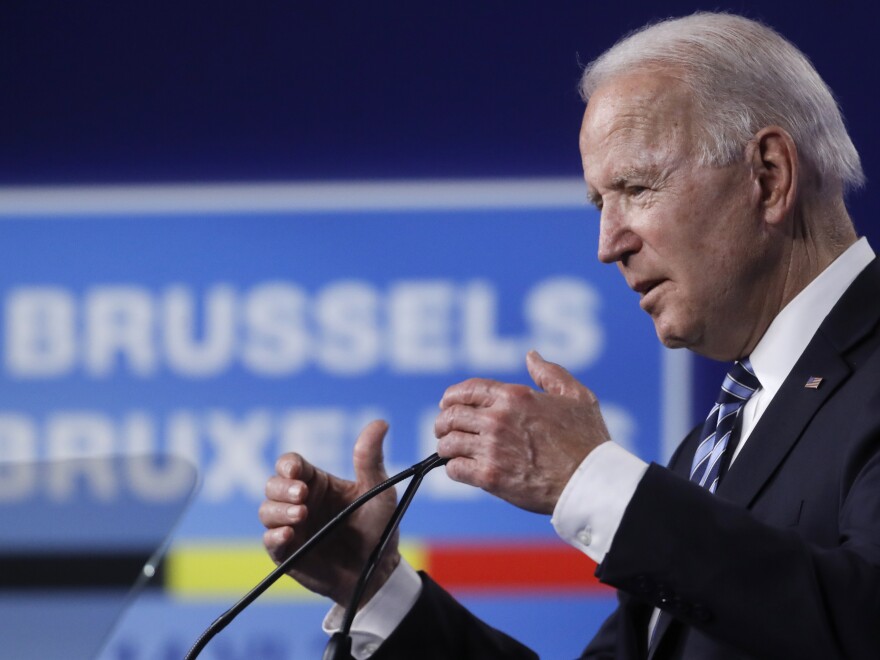Updated June 15, 2021 at 7:18 AM ET
President Biden on Tuesday announced a truce in a long-running trade war with the European Union, saying it was time to put aside the fight and focus together on the growing trade threats posed by China.
His Brussels stop at EU headquarters was the latest part of his mission to mend ties with allies that were strained by the go-it-alone approach of his predecessor before he sits down with Russian President Vladimir Putin in Geneva.
"I've been making the case that the U.S. and Europe — and democracies everywhere — are stronger when we work together to advance our shared values like fair competition and transparency. Today's announcement demonstrates exactly how that can work in practice," Biden said in a statement.
Biden also launched a trade and technology council during his session with Ursula von der Leyen, president of the European Commission, and Charles Michel, president of the European Council.
The high-level group will work on strategies to have common standards for new technologies such as artificial intelligence and biotechnology, regulations for technology platforms and export controls, and proposals to reform the World Trade Organization — all areas where China poses a significant challenge.
The U.S. and EU laid the foundations of the world economy and the rules-based international order after World War II. Together @POTUS and EU Leaders begin the work of updating those rules to protect our health, our climate, and to ensure democracy delivers for our people. https://t.co/EVDtxXdSI3
— Jake Sullivan (@JakeSullivan46) June 15, 2021
The United States and EU have fought for 17 years over the use of tools such as subsidized loans and tax breaks to support the aerospace sector. In 2019, the World Trade Organization ruled that both sides were breaking the rules.
The WTO authorized the United States to apply tariffs on $7.5 billion of imports from the EU per year — tariffs that affected not only aircraft, but items such as wine and cheese. At the time, then-President Donald Trump called it a "big win."
The WTO also allowed the EU to apply tariffs on $4 billion of U.S. exports.
In March, shortly after Biden took office, U.S. and EU negotiators agreed to suspend the tariffs for four months. The new truce extends the suspension by five years.
Biden on why some Trump trade policies remain in effect: "120 days. Give me a break. I need time." pic.twitter.com/iL6F1lwHAe
— Jan Wolfe (@JanNWolfe) June 13, 2021
U.S. Trade Representative Katherine Tai told reporters the deal was a model for trade spats in other sectors that China has roiled.
While she did not specifically mention the U.S. tariffs on European steel and aluminum exports, those Trump-era tariffs also were spurred by Chinese metals flooding markets.
European allies were particularly offended when Trump slapped tariffs on their exports of steel and aluminum justifying them as being needed to protect U.S. national security.
Those tariffs remain. Biden said his administration has not had enough time to work them out. Asked on Sunday how he justified keeping the Trump-era tariffs, Biden bristled. "A hundred and twenty days. Give me a break. Need time," he said.
The two sides hope to resolve the dispute by the end of the year, they said in a statement after the summit.
"for Europe, China is a really important trade and economic partner" so it's an accomplishment for President Biden "to have such tough statements about China in these 2 European summits" Heather Conley of @CSIS to @nickschifrin @NewsHour
— Judy Woodruff (@JudyWoodruff) June 14, 2021
Trade deals are one of many areas the Biden administration needs to flesh out to be able to show gains from its approach to foreign policy.
While Biden brought allies at the G-7, NATO and EU on board with the concept of taking a tougher stance on China, there are few details on how that will happen.
There may have been convergence around the idea that "China is the challenge of our time, and that countries that are like-minded have to work together," said Bonnie Glaser, a China expert at the German Marshall Fund of the United States.
But some European countries remain nervous that being too aggressive could backfire, hurting trade and investment with Beijing. "We have seen a growing tendency in China to retaliate against countries that criticize it," Glaser said.
And despite the "positive veneer" and goodwill on Biden's initial tour, allies wonder what they'll see in the next administration, or the one after that, said Andrea Kendall-Taylor, who advised the Biden team during the transition to the White House.
"The European Union members are concerned that President Biden is an anomaly and that we could very easily snap back to a Trump-like president where alliances and the value of Europe is called into question," said Kendall-Taylor, now with the Center for a New American Security.
Biden and his team are acutely aware that they have to do a better job selling the benefits of their foreign policy when they get back home. Biden talked about it during his campaign,
"Everything we do in our foreign policy should ultimately be judged by the metric of whether it is making life better, safer and easier for families in the United States," the senior administration official said.
Copyright 2021 NPR. To see more, visit https://www.npr.org.



